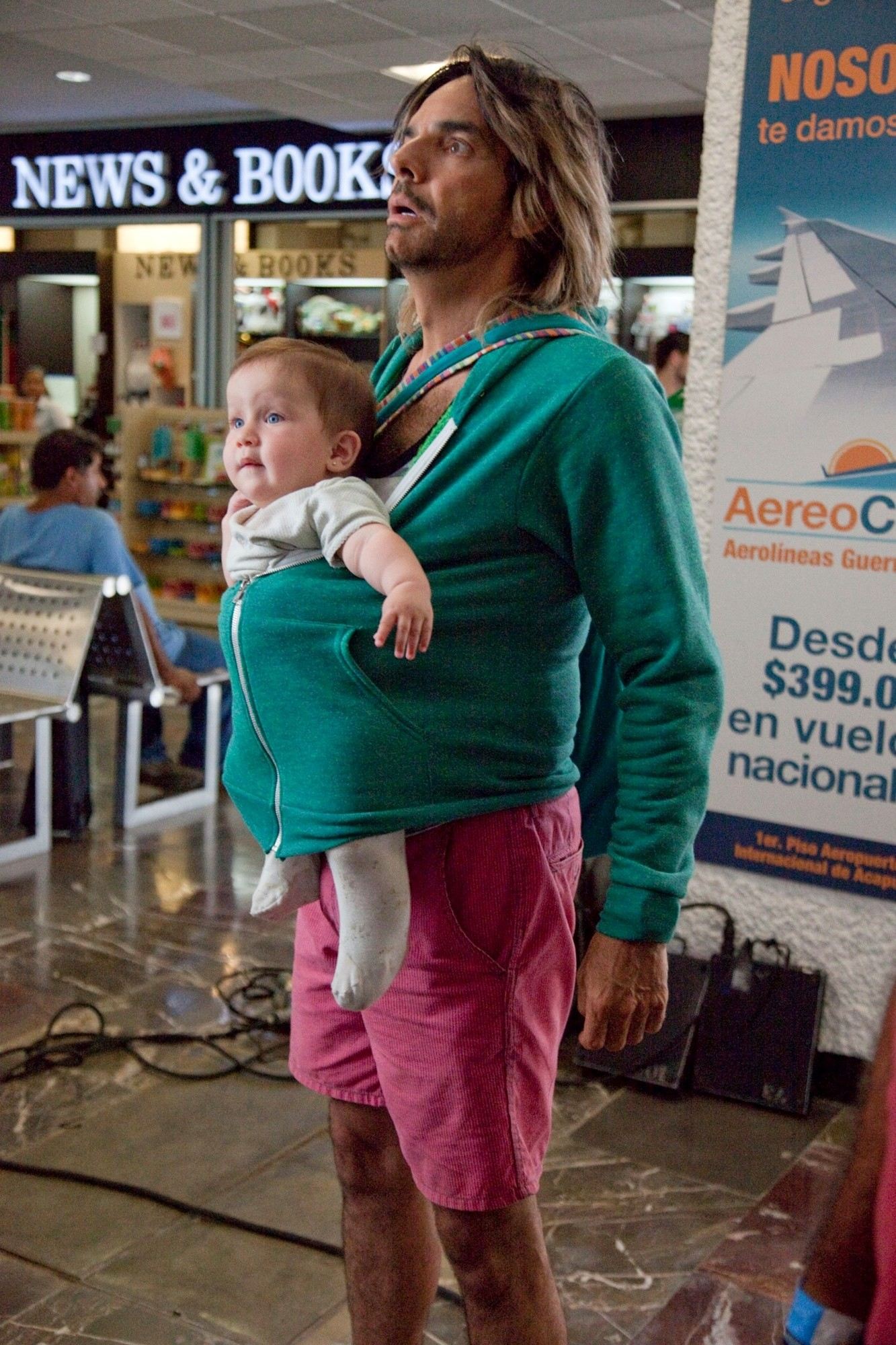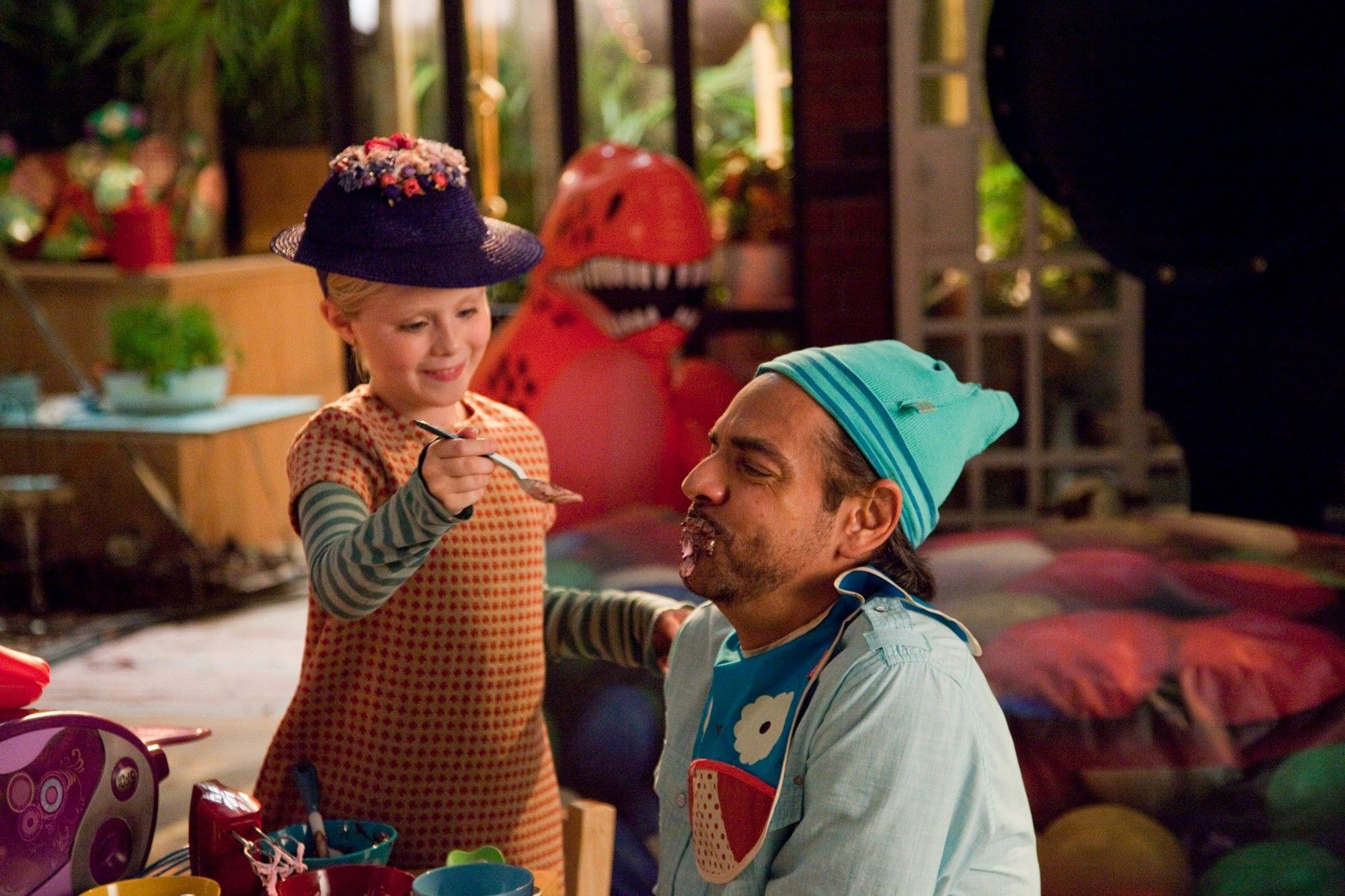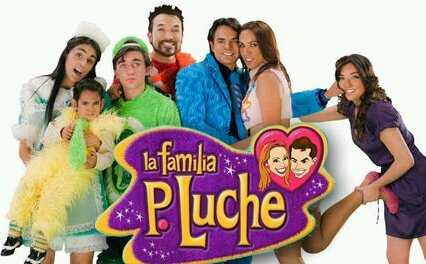Instructions Not Included is a comedy and drama film that was aired on September 6, 2013, and directed by Eugenio Derbez. The actors who played in this movie were Valentin (Eugenio Derbez), the girl Maggie (Loreto Peralta), and Maggie’s mother, Julie (Jessica Lindsey). The original version was in Spanish No Se Aceptan Devoluciones then translated in English to Instructions Not Included. Both versions are easy to understand and follow, compared to other versions of translations. Usually, the translations do not make sense or cause emotional reactions to viewers.
 Eugenio Derbez originates from Mexico City, Mexico. He is an actor, director, writer, and producer. He earned two degrees in Mexico. One degree in Film Directing from the Mexican Institute of Cinematography and Theater and the second in Acting from Televisa Acting School. Currently, he is furthering his education in Los Angeles, California, taking classes to become a better actor, director, writer, and producer. He is known in Mexico and Los Angeles for his comedy and characters. He created and produced various successful television series in Mexico, such as XHDerbez, Vecinos, and La Familia Pluche. He received a star on the Walk of Fame recently, and the Latino community was happy that he had been recognized for the impressive work he has done over the years. He not only moved to Los Angeles to further his education, but to become a well-known actor, producer, writer, and director. He has participated in several films such as Under the Same Moon (2007), The Book of Life (2014), Miracles from Heaven (2016), Girl in Progress (2012), Beverly Hills Chihuahua (2008), and children’s movies that have been translated into Spanish like Shrek, Shrek 2, and Mulan. If you will like to learn more about Eugenio Derbez, here is the link to his biography http://www.imdb.com/name/nm0220240/, an article about his crossover to Hollywood by Fox News http://latino.foxnews.com/latino/entertainment/2013/10/25/eugenio-derbez-shows-hollywood-what-latinos-want-at-box-office/, and a list of things people did not know about him http://www.huffingtonpost.com/2013/11/27/eugenio-derbez-facts_n_4349662.html.
Eugenio Derbez originates from Mexico City, Mexico. He is an actor, director, writer, and producer. He earned two degrees in Mexico. One degree in Film Directing from the Mexican Institute of Cinematography and Theater and the second in Acting from Televisa Acting School. Currently, he is furthering his education in Los Angeles, California, taking classes to become a better actor, director, writer, and producer. He is known in Mexico and Los Angeles for his comedy and characters. He created and produced various successful television series in Mexico, such as XHDerbez, Vecinos, and La Familia Pluche. He received a star on the Walk of Fame recently, and the Latino community was happy that he had been recognized for the impressive work he has done over the years. He not only moved to Los Angeles to further his education, but to become a well-known actor, producer, writer, and director. He has participated in several films such as Under the Same Moon (2007), The Book of Life (2014), Miracles from Heaven (2016), Girl in Progress (2012), Beverly Hills Chihuahua (2008), and children’s movies that have been translated into Spanish like Shrek, Shrek 2, and Mulan. If you will like to learn more about Eugenio Derbez, here is the link to his biography http://www.imdb.com/name/nm0220240/, an article about his crossover to Hollywood by Fox News http://latino.foxnews.com/latino/entertainment/2013/10/25/eugenio-derbez-shows-hollywood-what-latinos-want-at-box-office/, and a list of things people did not know about him http://www.huffingtonpost.com/2013/11/27/eugenio-derbez-facts_n_4349662.html.






The film is about a young man who is promiscuous, irresponsible and parties a lot. This is a stereotype that is very common in the Latino community. Unfortunately, in our community, these are characteristics of men, and they are acceptable as part of Machismo. These characteristics are not viewed well among woman. His life changed, when one of his many, one night stands knocked his door and left a baby at his doorsteps. She tells him they had sexual intercourse. As a consequence, she became pregnant and had a baby girl. She then asks for money to pay the taxi driver. He gives her money, and she hands him the baby. She then walks off to pay the man and never comes back. He did not know what to do with the baby, and he was aware that he was not capable of caring for the child. Another stereotype is that men are not capable of caring for children regardless if they are their own. The women must always care for the children, and the men must provide; again Machismo. He then remembered the birth mother lived in the United States of America, and he decided to immigrate with the baby. He immigrated to Los Angeles, California. The film portrayed crossing the border as something that was not difficult to do. He had trouble putting the money together, took time, and not knowing the language was a barrier. He had a difficult time finding the mother once he arrived and eventually fell in love with the baby. He takes any job to make money to support his daughter. He faced a difficult journey as a single father. He raised a girl on his own, in a place where he knew no one. The language was a barrier, and he had to hide like many immigrants today. The film and the actor portrayed the reality of many fathers and mothers that live in the United States today, who work endlessly any job to make a living and support their children. A point that I found interesting was he never intended to stay in the United States of America; he only wanted to return the baby and go back home. I have heard this from many family members who immigrated to this state to make money to support their family and intended to go back to their country of origin which hardly happens. After six years, the mother reappears confesses the child is not his and wants the child back. He fights for the custody of the girl who he thought for six years was his. During the time he was working in Hollywood taking positions as extra in many movies, he became successful and earned well enough to provide for his child. There is a custody dispute throughout the film the child becomes ill and eventually dies.



The story points out Valentin’s struggles of being a single father, being an immigrant, and experiencing the death of his child. Valentin believed he was not capable of caring for the child. Eventually, he learned to be an amazing father. Being a parent is not an easy job. A child completely changes one’s life, and one has to mature and become responsible. That is what the film illustrated. The film had stereotypes of machismo: Valentin was promiscuous, irresponsible, and immature. He also felt he was not capable of caring for a child. Since he was a man, it was acceptable for him to behave this way, and no one looked at him as being wrong or judged him. But the film then destroyed this stereotype when he became a loving, caring, and responsible father. He cared for the child for six years and then engaged in a committed relationship. This film is an example that Latino men can be loving, caring, responsible, and passive like in Real Women Have Curves. Another stereotype that was addressed was the one of the immigrants crossing the border. A stereotype that was illustrated was that it’s not hard crossing the border, and from the stories I have heard that is a myth. I understand the film was not centered on that idea, but it would have been nice to have approached that in a different way. This stereotype reminded me of some of the stereotypes in Speedy Gonzalez and Born in East LA, especially the scenes of Rudy crossing the border where it seemed not so difficult like anyone can do it and survive. The stereotype that was clarified was that immigrants take the jobs that are available, and no one wants to do. They are not stealing or taking anyone’s job. Immigrants overcome many barriers, such as the language, law enforcement, and finding a job to have a better lifestyle.


If you like to learn more about Eugenio Derbez, I have posted links above that will take you to his biography and news about him. I have also posted and summarized some of his work below.

One of my favorite characters in XHDerbez is the “El Diablito”. This like many of his work is a comedy show that involves many characters in different settings. This show is available through Amazon, YouTube, and Netflix. Here is the link if you will like to learn more about this show http://www.imdb.com/title/tt0409642/0.
https://www.youtube.com/watch?v=mLJLoZOFKHs

Vecinos translates in English to neighbors. The series is a comedy about the neighbors that live in an apartment building and have to learn how to get along because they cannot afford to move out. The series has a diverse group of neighbors like a promiscuous woman, a gay man, punk rocker teenager, preppy teenager, a naughty child, docile husband, evil wife, friendly apartment manager, educated and successful woman, and a business man. Here is the link to learn more about the series http://www.imdb.com/title/tt0469247/.

He played as Ludovico, the father in the family of the show, La Familia Pluche; this is a comedy show based on a dysfunctional family. This was a hit show in Mexico and the United States of America. This show is available on YouTube, Netflix, Hulu, and Amazon. Here is the link to learn more about the show http://www.imdb.com/title/tt1244672/.

I absolutely love this movie! I saw it in the theater and was so impressed with it. I had no idea Eugenio Derbez was such a star in Spanish tv and films. What a sad movie as well. I feel like the role he plays in this film is similar to how Josephina Lopez portrayed Latino men in Real Women Have Curves. He is a gentle, kind, man who turns out to be an amazing father. Completely against the ‘machismo’ stereotypes of Latino men. Even in the beginning of the film when they try to portray him as a womanizer and a partier, it so unbelievable because I feel this actor is genuinely a kind, gentle man. Great review and I appreciate you giving us Eugenio’s backstory with a link to all his accomplishments.
Great Blog! I agree they play on the stereotypes of Latino men as Machista . Latinos don’t deal with the Woman’s work ( dealing with a children). The men carry on to party, while the woman tends to everything else. I like how the script was flipped for him to handle being a single dad. This latino must put down his Machista attitude and transform into a loving father. This is quite the transformation in character. Is it me or doesn’t he remind you guys of Billy Bob Thornton? Son primos?
I saw this movie a few months ago and i thought it was great. This reminded me of when my brothers ex girl friend did the same to him as they did to Derbez. She came to the house and dropped of my nephew at the house and left. However, when he was like 12 years old, she came back into the picture and wanted him back. My brother being suck a nice guy let her take him back. He is now a great father and takes great care of his children. In the movie Derbez has a difficult time with the baby but manages to do a good job at the end. He does well be caring for her and take good care of her and also by teaching her well. This is a movie that even in real life deal with. Not only men live their children, women do the same. Great post!
This movie is such a tear jerker and so great. I agree with you about the issues of a language barrier that are portrayed in the film and how accurate it is to many families. So many immigrants in LA have a hard time communicating when they get here because of the language barrier, and often have to have their kids translate in everyday situations. It also shows what parents who come over are willing to do just to provide for their kids and give them a better life. I loved how accurate the Spanish was in Acapulco as well, I used to go there and be like are you even speaking Spanish? It really shows the variety that exists in Mexico, they are not all the same. The father also represents the machismo male, in that he is not afraid of anything and makes his son believe that he should not be either. Thanks for more material that he is in too, I definitely want to look into it.
I am glad you enjoyed the links about Eugenio Derbez. I love his work, and I think he has contributed a lot to the Mexican media industry. Now he is contributing in Hollywood, and he is doing such an amazing job, and he needs to be recognized, for his work. He is also portraying Latinos in a positive way.
Yes, he does transform as a character. I think it’s important for Latino men to know it is ok to show feelings and be awesome fathers. Si son primos.
Yes, I agree there are women who leave their children and families because they are not ready. The amount of newborn babies being abandoned in toilets, streets, and so on has risen over the past few years; it is sad. There are men out there who play both roles, and they do an amazing job.
Yes, I know their Spanish is so good in Acapulco. Being bilingual strengthens your brain and transforms. I read that today, and I posted the link on Facebook. That is mean they really used to ask you if you were even speaking Spanish, it is hard to be perfect in both languages.